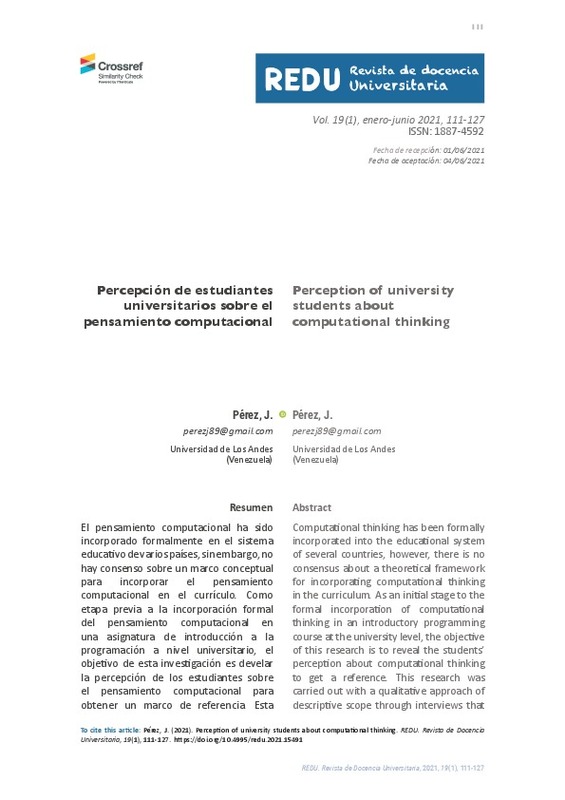Adell, J., Llopis, M., Esteve, M. y Valdeolivas, N. (2019). El debate sobre el pensamiento computacional en educación. RIED. Revista Iberoamericana de Educación a Distancia, 22(1), 171-186. https://doi.org/10.5944/ried.22.1.22303
Aho, A. (2012). Computation and computational thinking. The Computer Journal, 55(7), 832-835. https://doi.org/10.1093/comjnl/bxs074
Basogain, X., Olabe, M. y Olabe, J. (2015). Pensamiento Computacional a través de la Programación: Paradigma de Aprendizaje. Revista de Educación a Distancia, 46(6), 1-33. https://doi.org/10.6018/red/46/6
[+]
Adell, J., Llopis, M., Esteve, M. y Valdeolivas, N. (2019). El debate sobre el pensamiento computacional en educación. RIED. Revista Iberoamericana de Educación a Distancia, 22(1), 171-186. https://doi.org/10.5944/ried.22.1.22303
Aho, A. (2012). Computation and computational thinking. The Computer Journal, 55(7), 832-835. https://doi.org/10.1093/comjnl/bxs074
Basogain, X., Olabe, M. y Olabe, J. (2015). Pensamiento Computacional a través de la Programación: Paradigma de Aprendizaje. Revista de Educación a Distancia, 46(6), 1-33. https://doi.org/10.6018/red/46/6
Bayeck, R. (2018). A review of five African board games: is there any educational potential? Cambridge Journal of Education, 48(5), 533-552. https://doi.org/10.1080/0305764X.2017.1371671
Bocconi, S., Chioccariello, A. y Earp, J. (2018). The Nordic approach to introducing Computational Thinking and programming in compulsory education. Report prepared for the Nordic@ BETT2018 Steering Group, 397-400.
Brennan, K. y Resnick, M. (2012). New frameworks for studying and assessing the development of computational thinking. En Proceedings of the 2012 Annual Meeting of the American Educational Research Association, 1-25.
Compañ, P., Satorre, R., Llorens, F. y Molina, R. (2015). Enseñando a programar: un camino directo para desarrollar el pensamiento computacional. Revista de Educación a Distancia, 46(11), 1-15.
Csizmadia, A., Curzon, P., Dorling, M., Humphreys, S., Ng, T., Selby, C. y Woollard, J. (2015). Computational thinking - A guide for teachers. United Kingdom, Computing at
School.
Delcker, J. e Ifenthaler D. (2017). Computational Thinking as an Interdisciplinary Approach to Computer Science School Curricula: A German Perspective. En Rich P. y Hodges C. (eds) Emerging Research, Practice, and Policy on Computational Thinking. Educational Communications and Technology: Issues and Innovations. Springer, Cham. https://doi.org/10.1007/978-3-319-52691-1_4
Espinosa, A. (2017). Profesores "migrantes digitales" enseñando a estudiantes "nativos digitales". MediSur, 15(4), 463-473.
Flick, U. (2015). El diseño de la investigación cualitativa. Madrid, España: Ediciones Morata.
Galeano, M. (2004). Diseño de proyectos en la investigación cualitativa. Medellín, Colombia: Universidad EAFIT.
Hernández, R., Fernández, C. y Baptista, P. (2010). Metodología de la investigación. México: McGraw-Hill.
Jagušt, T., Krzic, A., Gledec, G. y Grgi, M. (2018). Exploring Different Unplugged Gamelike Activities for Teaching Computational Thinking. En IEEE Frontiers in Education Conference (FIE). https://doi.org/10.1109/FIE.2018.8659077
Kordaki, M. y Kakavas, P. (2017). Digital Storytelling as an Effective Framework for the Development of Computational Thinking Skills. En 9th International Conference on Education and New Learning Technologies. https://doi.org/10.21125/edulearn.2017.2435
Mooney, A., y Lockwood, J. (2020). The Analysis of a Novel Computational Thinking Test in First Year Undergraduate Computer Science Course. All Ireland Journal of Higher Education, 12(1), 1-26.
Park, S., Song, K. y Kim, S. (2015). EEG Analysis for Computational Thinking based Education Effect on the Learners' Cognitive Load. En Proceedings of the Applied Computer and Applied Computational Science, Kuala Lumpur, Malaysia.
Pérez, J. (2019a). El pensamiento computacional en la vida cotidiana. Revista Scientific, 4(13), 293-306. https://doi.org/10.29394/Scientific.issn.2542-2987.2019.4.13.15.293-306
Pérez, J. (2019b). DINADI: una estrategia para el diagnóstico de nativos digitales en el ámbito universitario. Revista Paradigma, 40(1), 56-75.
Pérez, J. y Azuaje, M. (2019). LE1: una estrategia amistosa para un curso introductorio de programación. Revista Educación En Ingeniería, 14(28), 45-53. https://doi.org/10.26507/rei.v14n28.998
Pérez, J. y Castro, J. (2018). LRS1: un robot social de bajo costo para la asignatura "Programación 1". Revista Colombiana de Tecnologías de Avanzada, 2(32), 68-77. https://doi.org/10.24054/16927257.v32.n32.2018.3028
Pérez, J. y Pedroza, O. (2018). LM1: una metodología de estudio para la asignatura "Programación 1". Revista Educere, 22(73), 635-648.
Perkins, D. y Swartz, R. (1991). The nine basics of teaching thinking. En Costa, A., Bellanca. J. y Fogatry R. (eds). If minds matter: A forward to the future, 2, 53-69. Palatine:
Skylight Publications.
Polanco, N., Ferrer, S. y Fernández, M. (2021). Aproximación a una definición de pensamiento computacional. RIED. Revista Iberoamericana de Educación a Distancia, 24(1), 55-76. https://doi.org/10.5944/ried.24.1.27419
Sondakh, D., Osman, K. y Zainudin, S. (2020). A Proposal for Holistic Assessment of Computational Thinking for Undergraduate: Content Validity. European Journal of Educational Research, 9(1), 33-50. https://doi.org/10.12973/eu-jer.9.1.33
Strauss, A. y Corbin, J. (2002). Bases de la investigación cualitativa. Técnicas y procedimientos para desarrollar la teoría fundamentada. Colombia: Universidad de Antioquia.
Valverde, J., Fernández, M. y Garrido, M. (2015). El pensamiento computacional y las nuevas ecologías del aprendizaje. Revista de Educación a Distancia, 46(3), 1-18.
Wing, J. (2006). Computational Thinking. It represents a universally applicable attitude and skill set everyone, not just computer scientists, would be eager to learn and use. Communications of the ACM, 49(3), 33-35. https://doi.org/10.1145/1118178.1118215
Wing, J. (2008). Computational thinking and thinking about computing. Philosophical Transactions of the Royal Society A: Mathematical, Physical and Engineering Sciences, 366(1881), 3717-3725. https://doi.org/10.1098/rsta.2008.0118
Zapata-Ros, M. (2015). Pensamiento computacional: Una nueva alfabetización digital. Revista de Educación a Distancia, 46(4), 1-47. https://doi.org/10.6018/red/46/4
Zapata-Ros, M. (2019). Computational Thinking Unplugged. Education in the Knowledge Society, 20(1), 1-29. https://doi.org/10.14201/eks2019_20_a18
[-]









